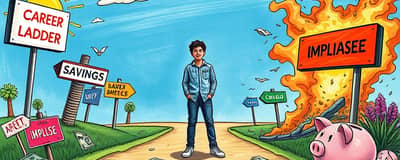Retirement Planning: Key Steps for Financial Preparedness

Retirement planning is a crucial process for individuals seeking financial stability in their later years. As we progress through our careers, it’s important to consider how we will sustain ourselves once we stop earning an active income. Without adequate preparation, retirees may face financial difficulties, which can adversely affect their quality of life.
Planning for retirement involves various considerations including savings, investments, healthcare costs, and lifestyle choices. Each decision made today can have a lasting impact on future financial security. Therefore, understanding the key steps in retirement planning is essential in ensuring you enjoy a comfortable and fulfilling retirement.
In this article, we will outline the fundamental steps involved in retirement planning and provide practical advice to help you prepare effectively for this significant life transition.
Why Retirement Planning is Important

Retirement planning holds enormous significance in today's fast-paced world where financial security is imperative. Many individuals tend to underestimate the amount of money needed for retirement, leading to insufficient funds to cover living expenses later in life.
The life expectancy continues to increase, which means retirees need to plan to sustain their financial needs for longer periods. Without a structured plan, individuals risk running out of savings and facing a challenging financial situation in their retirement years.
Moreover, the earlier one starts planning, the more time there is to accumulate wealth through different saving strategies and investment opportunities. This proactive approach can greatly impact the comfort and security of one’s retirement.
1. Determine Your Retirement Goals

The first step in planning for retirement is to define your personal retirement goals. Consider how you envision your lifestyle after you retire. What activities would you like to pursue? Where do you want to live? These goals will guide your financial needs for retirement.
Establishing specific targets can help shape your savings plan, reserve accounts, and investment strategies. Understanding your wants and needs is an essential part of the planning phase, as it will directly influence the amount you need to save.
- Decide on the age you want to retire
- Identify your desired lifestyle and activities
- Consider where you wish to live during retirement
Once you have a clear understanding of your goals, you can start to build a financial plan that aligns with achieving them. A well-structured plan will propel you towards financial security during your retirement years.
2. Assess Your Current Financial Situation

To create an effective retirement plan, it’s critical to evaluate your existing financial situation. This includes measuring your current savings, debts, income, and expenses. Understanding your financial landscape will inform how much you need to save for retirement.
- Calculate your net worth (assets minus liabilities)
- Review your existing retirement accounts
- Analyze your monthly expenses and income
After conducting this financial assessment, you can determine more clearly how much you need to save to meet your retirement goals. This will help in creating a robust financial strategy for your retirement.
3. Create a Retirement Savings Plan

Developing a targeted retirement savings plan is essential to achieve your goals. Start by determining how much you need to save each month to maintain your desired lifestyle post-retirement. Use retirement calculators to assist in the estimation process and adjust your contributions accordingly.
Incorporating various saving strategies can enhance your retirement fund. Consider utilizing employer-sponsored retirement accounts, such as a 401(k), as well as personal retirement accounts like IRAs to maximize your savings. Diversifying your savings across multiple accounts can also minimize risk and increase potential returns.
It's also important to regularly reassess your contributions as your financial situation changes; raises, bonuses, or debt payoffs should reflect in your saving strategy to ramp up your retirement progress.
4. Understand Retirement Account Options

Having a clear understanding of retirement account options is vital for effective planning. There are various accounts available that cater to different needs and goals, such as 401(k)s, Roth IRAs, and traditional IRAs. Each has its unique benefits and tax implications, which can strongly affect your retirement funds.
Before choosing an account, assess your current job status, income level, and tax situation. Consulting with a financial advisor can also help clarify which retirement account is best aligned with your financial aspirations.
- 401(k) plans
- Traditional IRA
- Roth IRA
- SEP IRA
Understanding these options empowers you to make informed decisions about which retirement accounts will yield the best outcome for your unique situation.
5. Invest Wisely

Investment choices have a significant impact on your retirement savings growth. It is essential to diversify your investment portfolio to spread risk and enhance returns. A well-balanced portfolio can include equities, bonds, mutual funds, and real estate.
As you approach retirement age, revisit your investment strategy. Risk tolerance typically decreases as retirement nears, necessitating a shift towards more stable, income-generating assets that provide security while preserving capital.
- Stocks and equities for growth
- Bonds for income stability
- Real estate for diversification
Investing wisely requires ongoing education and possibly professional advice, so that you can align your investments with your retirement goals.
6. Estimate Your Retirement Expenses

An accurate estimate of your retirement expenses is crucial for effective planning. Consider factors such as housing costs, daily living expenses, and discretionary spending on travel and hobbies.
- Housing costs (mortgage, rent, property taxes)
- Healthcare services
- Daily living expenses (food, utilities)
- Leisure activities
Having a comprehensive understanding of your expected retirement costs helps ensure you won’t run out of money when it’s needed most.
7. Consider Healthcare Costs

Healthcare can be one of the biggest expenses in retirement, and planning for it is essential. With increasing healthcare needs as we age, you must include this in your financial estimates.
8. Plan for Long-Term Care

Long-term care is another significant aspect of retirement that can have financial consequences. Nursing homes, assisted living, or in-home care can quickly deplete savings if not appropriately planned for. Understanding your options and potential costs will allow for better preparation.
9. Social Security and Pension Benefits

Social Security and any pension benefits you may have are key components of your retirement income. It’s important to understand how these benefits fit into your overall financial picture. Examine when to take Social Security to maximize your benefits, as timing can substantially impact your monthly income.
Pension plans typically vary greatly among employers and can similarly contribute to your retirement security. Ensuring you are able to collect your pension without penalties is crucial in your planning process.
Gather relevant information and documentation about your possible entitlements to make informed decisions that will support your financial needs in retirement.
10. Regularly Review and Adjust Your Plan

Retirement planning is not a one-time task; it requires ongoing maintenance and adjustment. Life changes, such as marriage, divorce, job changes, or a significant financial change, necessitate revisiting your retirement plan.
Regularly reviewing your plan ensures alignment with both your current financial situation and your retirement goals. Adjusting your savings rate, investment strategy, and expenses is part of maintaining an effective retirement plan.
Conclusion

In conclusion, retirement planning is a significant endeavor that requires careful thought and strategy. By following the steps outlined, individuals can build a reliable plan that aligns with their financial goals and retirement aspirations. Taking the time to assess and prepare for this important phase of life can result in a stress-free and enjoyable retirement experience.
Investing in your future through actionable planning not only secures financial stability but also provides peace of mind as you approach retirement age. The earlier you start planning, the better positioned you will be to live comfortably and pursue your interests in retirement.
Ultimately, a well-crafted retirement plan will lead to a fulfilling lifestyle where you can enjoy your golden years without the worry of financial constraints. Don't hesitate to start your planning today.






